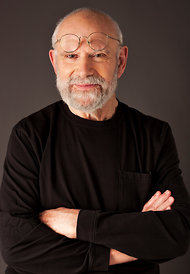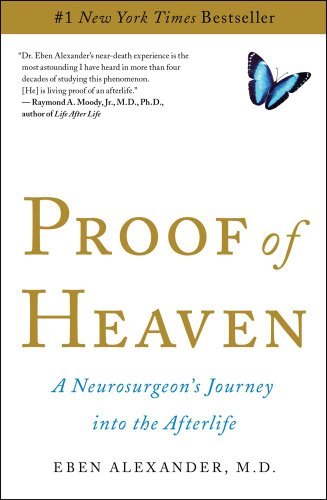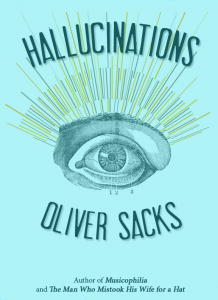Tags
" "Seeing God in the Third Millenium, "Hallucinations, "Proof of Heaven, "The Science of Heaven, David P. Stang, Dr. Eben Alexander, Dr. Oliver Sacks, Near Death Experiences
Family and friends can take you to some really strange ‘places.’ After joining my wife on a trip to Peru and into the Amazon recently, I went to Columbus, OH for six days for the Obama campaign because a friend urged me to do so. And now another friend wants to take a small group of us on horseback through the battlefield at Gettysburg. And then there’s this posting.
Dave Stang, someone I’ve known for maybe 35 years, has been talking to me for the last couple of years about near death experiences and other such occurrences. When I recently mentioned Oliver Sacks new book Hallucinations, I thought Dave was going to have a seizure.
As I have written in the past, I am a big fan of neurologist Oliver Sacks, having read most of his books, including his newest. Sacks continually teaches me about the workings (and ‘misworkings’) of the brain and in presenting his case studies of his patients, I find myself endlessly fascinated by what he presents and how he honors the patients with whom he works
And most of the folks I know who know of Oliver Sacks often express similar views.
Not, however, is that true of all. Certainly not for Dave.
There seems to be great skepticism of Sacks and his views, particularly about hallucinations, especially by those who believe in alternative realities, life after death experiences, etc.
So, at the suggestion of Dave, I am linking to two articles that recently appeared in magazines around this specific issue The first is by Dr. Eben Alexander, a neurosurgeon, who wrote a recent cover story in Newsweek about his “journey to the afterlife.” Dr. Eben is also the author of the best selling book Proof of Heaven.
The second article is by Dr. Sacks in the Atlantic in which he takes issue with Dr. Alexander and others who believe in and write about such experiences.
Following those two links, I am posting Dave Stang’s own article, Oliver Sacks: Master Hallucinator, which he wrote, in part, for my ‘edification’ (he is constantly trying to ‘improve’ me, with limited success, I think) and which he sent to me yesterday..
(Note: Dave frequently tells me he “never overstates.” I’ll leave it to MillersTime readers to judge his veracity on that score, but I have learned over the years that, on occasion, there are kernels of truth to some of Dave’s views.)
You judge this one.
1. The Science of Heaven by Eben Alexander, Newsweek, Nov. 26 & Dec. 3, 2012, in which Dr. Alexander writes about his own near-death experience and journey to the after life.
2. Seeing God in the Third Millenium, by Oliver Sacks, The Atlantic, Dec. 12, 2012, in which Dr. Sacks takes issue with Dr. Alexander and with those who believe in near death experiences.
3. Oliver Sacks: Master Hallucinator, by David P. Stang, Dec.14, 2012, MillersTime, attached just below in its entirety.
Oliver Sacks: Master Hallucinator
by David P. Stang
For Ollie Sacks to impugn his distinguished neurosurgeon colleague physician  Eben Alexander by imputing his near death experience reported in the latter’s book Proof of Heaven to be nothing more than a bizarre hallucination, caused by the malfunctioning of Dr. Alexander’s brain and asserting that for Dr. Alexander “to deny the possibility of any natural explanation for [his] NDE…is more than unscientific — it is antiscientific” is as unprofessional as it would be for Dr. Alexander to refer to Dr. Sacks as an enfeebled, doddering, senescent, nearly senile fool whose most recent portrait on the back of his new book, Hallucinations, portrays Dr. Sacks hallucinating through a set of eyeglasses just in front of what he apparently believes to be an extra set of eyes in the middle of his forehead.
Eben Alexander by imputing his near death experience reported in the latter’s book Proof of Heaven to be nothing more than a bizarre hallucination, caused by the malfunctioning of Dr. Alexander’s brain and asserting that for Dr. Alexander “to deny the possibility of any natural explanation for [his] NDE…is more than unscientific — it is antiscientific” is as unprofessional as it would be for Dr. Alexander to refer to Dr. Sacks as an enfeebled, doddering, senescent, nearly senile fool whose most recent portrait on the back of his new book, Hallucinations, portrays Dr. Sacks hallucinating through a set of eyeglasses just in front of what he apparently believes to be an extra set of eyes in the middle of his forehead.
Now why would an old geezer like the octogenarian Dr. Sacks make such a point at pejoratively slamming, possibly libeling, his much younger and more ably functioning physician colleague Dr. Alexander first indirectly in an interview in the New Yorker magazine and then more explicitly in the most recent issue of the Atlantic magazine?
The obvious answer is that for Dr. Sacks to accept as descriptions of reality Dr. Alexander’s recollections concerning the details he observed in the afterlife realms would destroy the conceptual foundation stones upon which Dr. Sacks has predicated his career as the purported world’s leading neurologist on the subject of hallucinations. Dr. Sacks – The Master Hallucinator – represents the archetype of adherents to the now outmoded scientistic, materialistic reductionist epistemology.
This materialist epistemology has three major components: the first is the contention that every dimension of human consciousness including, but not limited to, every thought, perception, fantasy, concept, sense of self, dream or daydream, emotion, or any other such mental phenomena involving various combinations of neurons and synapses of every person who has been, or whoever will be, incarnate originated only and exclusively in the brain, and certainly nowhere else, irrespective of protestations otherwise made by enlightened students of consciousness studies. Thus, in the hallucinating mind of Dr. Sacks, poor ole Dr. Alexander’s bacterial meningitis addled brain must’ve been clicking right along for him even to have been able to participate in a near death experience, let alone the slam- bang, pyrotechnic doozy NDE Dr. Alexander wrote about in his book Proof of Heaven.
Ollie Sacks and his materialist friends offer no persuasive proof of this first contention; they only dogmatically assert it, then persistently name-call anyone who opposes this unfounded belief by calling them “Hallucinator”, “Insane”, “Ignorant”, and “Anti-scientific”.
Dr. Sacks’s second materialist epistemological component is that for any allegations made by Dr. Alexander, or even lesser mortals, regarding any personal subjective perception to be validly regarded as real it must involve an encounter with some form of material object that can be perceived through the five senses functioning in a non-extrasensory modality. Thus, for anyone to claim that he witnessed an object or event which occurred in non-material form would be Ab Initio, on its face an hallucination. By implication, Dr. Sacks in his attack on Dr. Alexander is simultaneously impugning all visions, apparitions, prophecies, extrasensory perceptions, near death experiences, past life recollections, revelations or other thought forms involving awareness of nonmaterial reality which have occurred among all species of humankind throughout history beginning with the Neanderthals and possibly their more ape-like predecessors and continuing up to the present and into the infinite future. All these events in the mind of Dr. Sacks are absolutely and indisputably nothing more than delusional hallucinations.
Ollie Sacks and his materialist friends offer no persuasive proof of this second contention; they only dogmatically assert it, then persistently name-call anyone who opposes this unfounded belief by calling them “Hallucinator”, “Insane”, “Ignorant”, and “Anti-scientific”.
In his new book – which displays in a photograph on the back of the dust jacket  his hallucinatory bifocals placed in the middle of his forehead – Dr. Sacks states that out of the multitude of possible definitions for the term hallucination his favorite was penned by the remarkable William James in his 1890 Principles of Psychology. Professor James in that classic text stated, “An hallucination is a strictly sensational form of consciousness, as good and true a sensation as if there were a real object there. The object happens to be not there, that is all.”
his hallucinatory bifocals placed in the middle of his forehead – Dr. Sacks states that out of the multitude of possible definitions for the term hallucination his favorite was penned by the remarkable William James in his 1890 Principles of Psychology. Professor James in that classic text stated, “An hallucination is a strictly sensational form of consciousness, as good and true a sensation as if there were a real object there. The object happens to be not there, that is all.”
Apparently why Dr. Sacks is so fond of that definition is that he believes that for an object to be real it must first be material. Not-material equals not-real, that is all. Perhaps Dr. Sacks would also favor the 1984 edition of The Penguin Dictionary of Psychology which specifies that hallucination is: “A perceptual experience with all the compelling subjective properties of a real sensory impression but without the normal physical stimulus for that sensory modality. Hallucinations are taken as classic indicators of a psychotic disturbance and are a hallmark of various disorders like schizophrenia.” He might also find favor in Webster’s Third New International Dictionary published in 1975 which specified that hallucination is: “Perception of objects with no reality; experience of sensations with no external cause usually arising from disorder of the nervous system (as in delirium tremens or in functional psychosis without known neurological disease).”
The pejorative aspect of such definitions is that when used in writing or in speech the author or utterer is not only suggesting that the person claiming to have seen a non-material object as real is completely unjustified in reaching such a conclusion, but the person is also crazy, crazy enough to be slapped into a madhouse, strapped into a straitjacket and placed in a padded cell.
Years ago in law schools the textbooks on Torts when discussing slander and libel would indicate that malicious intent and likely economic harm needed to be proven in addition to proving that the alleged statement causing harm was not true. But then came the wonderful exception to the rule and that consisted of what is known as slander and libel per se. This special tort was believed to cause so much harm that the mere expression of it – irrespective of its truth and irrespective of the intent of the person who stated it – was woefully, horrifically and destructively injurious. Here the plaintiff need only prove that the defendant merely wrote or uttered the statement in order to be entitled to damages.
The two examples of slander and libel per se, often appearing in the old Tort books, were “calling a lawyer a shyster” and “alleging that a person had a loathsome disease” such as syphilis.
I believe that a legitimate case can be made for legislatively making it a civil or criminal offense that for anyone to accuse another of having an hallucination, that was based upon a nonmaterial object which was considered real by the person forming that impression. Indeed this prospective new tort should be made both a criminal and civil offense and considered slander or libel per se if any of the following elements are present:
(1) the accuser’s epistemology consists of one or any of the following value systems: materialist, reductionist or scientistic; or
(2) the accuser’s intent is to express or imply that the person having the alleged hallucination was and/or is by definition, in the mind of the accuser, suffering from any psychosis or any other form of mental disorder; or
(3) the accuser is a medical doctor who loses his cool and an accuses another medical doctor of having an hallucination; or
(4) the accuser is the neurologist, Dr. Oliver Sacks – The Master Hallucinatior – while he is still living; provided however, that if the disincarnate spirit of Dr. Sacks returns in any ghostly form to accuse any incarnate being of hallucinating he may make three such accusations gratis before becoming subject to criminal or civil slander or libel per se charges brought against him by any incarnate being harmed by such alleged slander or libel.
The third major component in the Trinity of materialist epistemological components adhered to by Dr. Sacks and his friends is that after one’s last breath, one’s last heartbeat, one’s last neuron to synapse firing all that remains of the once incarnate being is only an invisible poof.
No Consciousness. No Conscience. No Memory. No Soul. No Spirit.
No Afterlife. No Heaven. No Nirvana or Valhalla. No God. No Jesus.
No Buddha. No Muhammad. No Hebrew Prophets. No Great Spirit.
No Zoroaster. No Hindu Gods. No Angels. No archangels.
No Seraphims. No Cherubims. No Thrones. No Dominions.
No virtues. No Powers. No Principalities
No other kind of Angelic Being. No Saints. No Ascended Masters.
No Ancestors. No Loved Ones. No Kin. No Dead Grannies.
No Lonely Spinster Aunts. No Alcoholic Uncles.
No Children or Grandchildren. No Cat or Dog Spirits. No Fairies.
No Elves. No Hobbits. No Trolls. No Gnomes. No Nymphs.
No Undines. No Devas. No Hell. No Devil. No Blackguards.
No Demons. No Dragons. No Griffins. No Zombies.
No Incubuses. No Succubi. No Witches.
No Other Malign Entities of any kind.
Nothing Disincarnate going on anywhere.
No realms in which they could exist.
Not even a remote, faint, flicker of light to be seen.
Ollie Sacks and his materialist friends offer no persuasive proof of this third contention; they only dogmatically assert it, then persistently name-call anyone who opposes this unfounded belief by calling them “Hallucinator”, “Insane”, “Ignorant”, and “Anti-scientific”.
Under such circumstances where do we go from here? Is there even a slight possibility for hope? Maybe it’s wisest to avoid terrorizing Ollie into even beginning to suspect there may be as much as a scintilla of a chance, even a one in one goggle chance, of the survival of as little as the groggiest awareness after death.
How then do we deal with our beloved Master of Hallucination? In as much as Dr. Sacks appears to be closer to death than to being born again, let us hope that upon his passing he is greeted by a merciful and understanding psychopomp who might escort him to an idyllic and beautiful meadow (which he realizes is Heaven) where he meets a beautiful but unknown woman who conveys various messages to him telepathically. Advancing farther into the afterlife, despite his materialistic prejudices while earthbound, he might discover the ever-more-embracing presence of God.
God help him otherwise. Ollie lacks the contrition necessary to survive Purgatory. He’d probably find Sheol a bit stifling. And Hell is bad enough as it is without Ollie Sacks arriving to make it worse.
* * * * * *
(Ed. Note: The difference in sizes of the book covers at the top of this article and the size of the pictures of the two doctors within this post are not because I’m trying to ‘subtly’ influence readers. The truth is I’m technologically challenged and could not find a way to post book covers and pictures of similar sizes.
Also, if you Google Dr. Eben Alexander videos, you will have a choice of a number of interviews with the doctor that will give you more of a sense of the man and his ‘experiences.’)




dan berube said:
Well said sir. I have followed Dr Alexander for a year now. I’ve seen most if not all his interviews online. It’s quite clear to me he tried and tried to prove to himself that his experience was in the body. After 2 years of trying he was left with what he tells the world now. This man is the true missing link and other links will follow to prove life after death.
Dan Berube
Barbara Chernov said:
I loved David Stang’s article – thanks for sharing it. I haven’t read Dr. Alexander’s book but have seen him interviewed and I believe every word of it. This is nothing new and there are many, many other books out there conveying the same message.
Barbara Chernov
Tammy said:
I googled David Stang and found this…ha! Nice to see he is still alive and kicking in Kenmare…
After spending some time in graduate school learning to “see differently”, I came across the same tired, materialist philosophy over and over again. It’s particularly dangerous when conflated with this brand of positivism.
“One can never really give a proof of the reality of anything; reality is not something open to proof, it is something established. It is established just because proof is not enough. It is this characteristic of language, at once indispensable and inadequate, which shows the reality of the external world…” —Simone Weil
It’s more than a leap into the dark to embrace mystery, it’s an acknowledgement that a single methodology cannot predicate all realities.